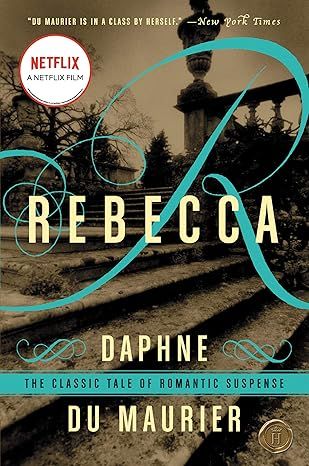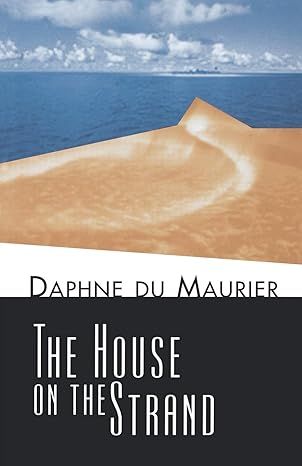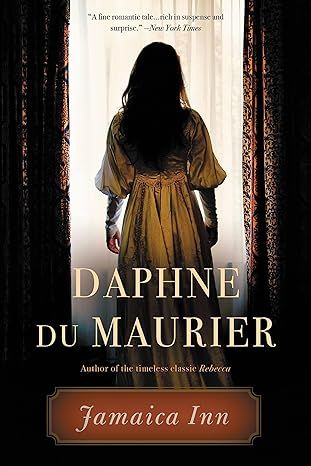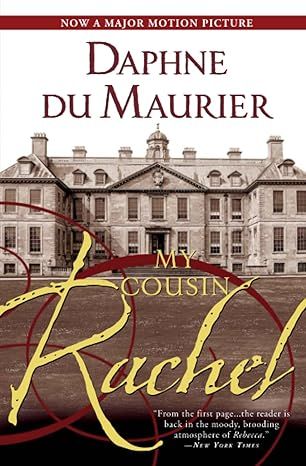Rebecca
4.5 out of 5
26,424 global ratings
The multi‑million‑copy bestseller that has enthralled generations of readers. A haunting tale of obsessive love. A mesmerizing psychological thriller.
In Monte Carlo, our heroine is swept off her feet by the dashing widower Maxim de Winter and his sudden proposal of marriage. Orphaned and working as a lady’s maid, she can barely believe her luck. It is only when they arrive at Manderley, her husband’s cavernous estate on the Cornish coast, that she realizes how vast a shadow his late wife, Rebecca, will cast over their lives—introducing a lingering evil that threatens to destroy their love from beyond the grave. This universally acclaimed novel has remained consistently in print since its original publication in 1938 and has frequently been adapted—for television, radio, the theater, and film—most notably in 1940 by Alfred Hitchcock, whose Rebecca received the Academy Award for Best Picture, and in the 2020 Netflix film starring Lily James and Armie Hammer.
“Excellent entertainment...Du Maurier created a scale by which modern women can measure their feelings.” —Stephen King
“One of the most influential novels of the twentieth century, Rebecca has woven its way into the fabric of our culture with all the troubling power of myth or dream.” —Sarah Waters
416 pages,
Kindle
Audiobook
Hardcover
Paperback
Audio CD
First published October 31, 1997
ISBN 9780380730407
About the authors
Daphne Du Maurier
Daphne du Maurier was born in 1906 and educated at home and in Paris. She began writing in 1928, and many of her bestselling novels were set in Cornwall, where she lived for most of her life. She was made a DBE in 1969 and died in 1989.
Reviews
Ann Brennan
5
I read this years ago
Reviewed in the United States on September 5, 2024
Verified Purchase
and then it was recently presented to me again. I knew I’d loved it then but couldn’t recall details. As I read it now I couldn't put it down. What a fantastic story! I know I’ll reread it again one day.
Drwo
5
The Girl With No Name Writes a Classic
Reviewed in the United States on January 25, 2013
Verified Purchase
Having read this book many times, I'm hoping a new generation of readers will discover an intriguing mystery without a single vampire, serial killer or one set in some apocalyptic future. Rebecca is dark and strange and almost impossible to put down, especially with the central character dead and the storyteller being a shadow.
The book begins with a dream about a house named Manderley perched on a knoll above the sea. The dream is told by the book's narrator and we learn that she once lived at Manderley but can never return.
The story really begins in a hotel in Monte Carlo in the 1930's where a young girl is the paid companion to a crass, social climbing older woman, Mrs. Van Topper. The older woman will sink to almost any depth to appear well connected and prominent and plants herself in the hotel lobby daily in an attempt to ingratiate herself with someone she deems important. She spots a man she recognizes as a wealthy,prominent Englishman, Maxim de Winter and forces him to have tea with her.
The young girl, whose diary is open to the reader, is horrified by Mrs. Van Topper's obvious attempts to extract personal information from de Winter by giving him the impression that they have friends in common. Although de Winter is not fooled by Mrs. Van Topper, sensing the young girl's anguish, he is kind to her.
The flu confines Mrs. Van Topper to her room, allowing the girl more time and she and de Winter begin to spend most afternoons together, something she records faithfully but does not share with Mrs. Van Topper. The diary records the girl's fascination with the handsome, older man who is often brooding and distant. She falls in love with the enigmatic and dashing de Winter, but realizes how unrealistic she is. The narrator knows that de Winter recently "lost his wife," Rebecca, but knows nothing beyond what Mrs. Van Topper has told her: that de Winter's wife drowned near Manderley and he never speaks of it.
Quite suddenly, Mrs. Van Topper decides to leave Monte Carlo and the girl is ordered to pack and prepare to leave. In a panic, she feels she must seek out Mr. de Winter to say goodbye and when she does, he proposes to her in an awkward way and she accepts. Mrs. Van Topper is angry and points out how unsuited the young girl is to become "mistress of Manderley."
When the girl arrives at Manderley after a rapturous honeymoon, she is awestruck and intimidated by the size of the house and has no idea how to assume her role as Mrs. de Winter. Maxim is off and about the estate seeing to affairs he has neglected and, since the girl is afraid to make errors in social judgment, she leaves all decisions to others, most especially to the head housekeeper, Mrs. Danvers, who reinforces the girl's insecurities by continually pointing out the former Mrs. de Winter's beauty, social skills and legions of admirers and friends. The reminders of Rebecca are everywhere; her personalized notecards still in her desk, closets filled with beautiful clothes, fur coats, monogrammed towels and robes with giant R's in script, and the girl becomes convinced that de Winter married her on a whim and remains hopelessly in love with the perfect Rebecca. Rather than learning her role as lady of the house, the girl is terrified that her husband will come to his senses and realize what a mistake he has made and she will lose him. Consequently, she is slow to pay attention to nuances in behavior and speech that would provide clues to what is happening around her.
Manderley is famous for its annual costume ball, a tradition de Winter loathes but agrees to suffer through as it is regarded as the height of the social season. The girl worries about how she will possibly live up to Rebecca's skills as a hostess and has no idea what costume to wear. Mrs. Danvers cleverly suggests a costume to replicate one of the many family portraits of long deceased family members lining the walls of Manderley, failing to disclose that her suggestion is for the girl to wear the exact costume worn by Rebecca at the previous ball.
On the night of the ball, as a drum signals, she descends the grand staircase to be met with silence, expressions of disbelief and gasps of horror. Maxim yells at her and orders her to go and change. She is humiliated and defeated and refuses to go back downstairs. Then she hears voices outside discussing her. "Guess they had a row and she is refusing to come out." "No one has seen her. Rebecca would have been here there and everywhere." Shaken, she suddenly realizes that as Mrs. de Winter, she has certain obligations and one is to overcome her fear and face the music. She makes it through the ball in misery.
The diary is the only information provided, so one never learns the girl's name, nor what she looks like, except for several remarks de Winter makes to her, saying that with a big ribbon in her hair, she would look like Alice in Wonderland Wretched though she is, the girl's despairing self-absorption is shelved by a dramatic event. A ship wrecks close to the shore and divers searching the wreck discover Rebecca's lost sailboat, an event which eventually turns the timid girl into a formidable force.
To reveal more might detract from the reader's experience. Written in another time, the lengths to which certain families went to preserve reputations and hide any unpleasantness may seem absurd. The anxiety felt by the girl, afraid to fail but having no idea how to go about gaining skills she is certain she lacks may seem naive to modern women but, in the end, Rebecca is a book about how imagination clouds the ability to see, or even seek, the truth and how living a lie erodes the soul. It is a story about how fear of the truth stops us from finding joy rather than misery and how what we imagine can be far different from reality. The narrative reveals how behind facades there can be nothing more than a cardboard theater set which has been continually propped up by the flimsiest of supports and if one support post fails, the entire structure collapses.
This psychological melodrama overlays a deeper message.
Read more
121 people found this helpful
Ella Mc
5
Du Maurier writes very melodramatic plot without ever tipping into sentimental
Reviewed in the United States on July 5, 2018
Verified Purchase
I'd never read this before, nor have I seen the movie I was missing so much. A wonderfully dark and deceptively told tale. I could feel the ambiance coming off the screen. I was shocked at all the psychological twisty, rather deep and dark Freudian/Jungian stuff found in this novel.It really affected me more than most dark and twisty psychological thrillers do.
Rebecca seems a fierce response or callback for lack of a better word to Jane Eyre. Both novels stand very firmly on their own. Rebecca need not be seen in light of other novels, but it's interesting to see how she responds to some of the material in the earlier classic.
Normally a simpering woman who is dying for a man to just sweep her away from it all (no matter when it was written) would turn me off. The fact that she's afraid to trouble him or speak up to him makes sense, but also made me very sad for her at first. The genius is though I kept thinking "pack it up. Leave him," I felt connected to the nameless narrator through the novel as if I was the one in her position. I felt stuck. I felt nervous. I cringed along with her. I found my pulse quickening every time Mrs. Danvers came near. I was scared - literally scared while reading this in the middle of the day.
The dreams that begin and end the book are stunning in the way they set the mood and tell the truth when our narrator can't seem to tell herself the truth. Her daydreams are full of fanciful, childish nattering, but the dreams are the real thing. The juxtaposition of the truth in her dreams v the silliness of her daydreams is very telling and full of foreboding. Du Maurier writes very melodramatic plot without ever tipping into sentimental or soggy language so well that it's almost easy to miss how melodramatic the plot actually is. She's also a master of class and all those games people play, which is a callback to Jane Eyre, but so much of this is in the narrator's fearful mind that it's wildly different from the actual scenes in Jane Eyre.
I also think the nameless narrator is a perfect way to add one more layer of her personality -- added to her hair, the way she dresses, all of her hiding, acquiescing, nail biting, her class and the way they met -- this is a well-built and very believable character. The daydreaming tops it off for me. She can't deal with her life and shunts all of her wishes and fears into fantasy.
One more thought is that these women - the two Mrs. de Winters - are like two sides of the same person, and in the end de Winter manages to kill them both (and they're both willing to let him.) Sure, the narrator is technically still alive, but it's just a slower/different form of death. There's a lot to say about that from the world of psychobabble, but I'll spare us all.
My final thought was "did Sylvia Plath love this novel?" I don't know, but in her late (mostly Ariel-era) poems, there's a lot that has the feel (and some of the imagery) of this novel. I tried to do a quick search, but all I learned is that Agatha Christie wrote to du Maurier about the nameless narrator.
I loved it. It moved me. If I'd gotten a degree in psychoanalysis, I would have wanted to use this as some part of my dissertation: especially in the responses of women to the women in the novel.
Read more
26 people found this helpful
Elle G
5
It will keep you on the edge of your seat
Reviewed in the United States on August 26, 2024
Verified Purchase
I read this book again today after 40 years. Though I have seen two different versions of the movie, I still couldn't put it down. It will keep you on the edge of your seat. There are some differences between the book and the movie so hold on!
Sydney Williams
5
"Rebecca," Daphne Du Maurier
Reviewed in the United States on November 28, 2020
Verified Purchase
Sydney M. Williams
“Rebecca,” Daphne Du Maurier November 28, 2020
“I can close my eyes now, and look back on it, and see myself as I must have been, standing on the threshold of the house, a slim awkward figure in my stockinette dress, clutching in my sticky hands a pair of gauntlet gloves.” The narrator thinks back on her arrival at Manderley Rebecca, 1938 Daphne Du Maurier (1907-1989)
Rebecca, among the most famous book titles, opens with one of fiction’s most recognized sentences: “Last night I dreamt I went to Manderley again.” Two years after publication, Alfred Hitchcock directed the Academy Award film starring Joan Fontaine and Laurence Olivier. In 2020, Ben Wheatley directed a new version, with Lily James and Arnie Hammer. While Hitchcock does a better job in portraying the dark mood of the story, neither, in my opinion, captures the novel’s full range.
Daphne Du Maurier wrote historical novels. She was a master of creating an atmosphere of dark moods and mysterious characters. Born in London, she spent much of her life in Cornwall. Novels like Jamaica Inn, Frenchman’s Creek, The King’s General and My Cousin Rachel were set in England’s west country. Manderley, Max de Winter’s home, is a large estate on the rocky coast of Cornwall; the time is the 1920s.
The story is told through a narrator, whose name we are never told, though Max de Winter tells her, “You have a very lovely and unusual name.” When we meet her, she is a paid companion to a wealthy, overbearing American, Mrs. Van Hopper – “…her short body ill-balanced upon tottering high heels, her fussy, frilly blouse a complement to her large bosom and swinging hips…”. They are staying in Monte Carlo in late winter. While the narrator is never described, we are led to understand she is English, about twenty years old, comely not beautiful, innocent not worldly – the antithesis of Rebecca, which is what attracts Mr. de Winter. He is a widower; his wife Rebecca having died the previous May. He is “tall and slim, with dark hair,” wealthy, aristocratic, in his early forties.
The dead Rebecca hovers over the novel, like a dark cloud. She obsesses the narrator who has become the new Mrs. De Winter. Rebecca was tall, clever, fond of sport, “a very lovely creature…full of life.” Mrs. Danvers, formerly her childhood nurse, is now housekeeper at Manderley. We first meet her through the eyes of the narrator: “Someone advanced through the sea of faces, someone tall and gaunt, dressed in deep black, whose prominent cheek-bones and great hollow eyes gave her a skull’s face, parchment-white, set on a skeleton’s frame.” The ghost of Rebecca, a deceitful phantasm, hovers over the large, isolated estate, made real through the devious intrigues of Mrs. Danvers.
Neither movie ends as does the book. Movies are a visual, but passive, art form, where the eye works and the mind can nap. Books require concentration and are most effective when the reader employs his or her imagination, guided by the author. Rebecca’s last sentence, as Max and the narrator drive home to Manderley: “And the ashes blew toward us with the salt wind from the sea.” Not the end a movie requires, but perfect for this story; you will be captivated by Ms. Du Maurier’s creative genius. I will say no more.
Read more
37 people found this helpful
Roger Brunyate
5
Read This on Kindle for the Wonderful Afterword
Reviewed in the United States on February 18, 2014
Verified Purchase
"Last night I dreamed I went to Manderley again." I must have read REBECCA before, but can't be sure. Still, something of the writing must have stuck. Reading the opening of the forthcoming book
30 people found this helpful
August
4
I'd recommend it.
Reviewed in the United States on May 1, 2024
Verified Purchase
It's a classic for a reason: great prose, good suspense, and a solid ending. That being said, I did feel like it dragged out at times and the narrator was sort of obnoxious.
Kindle Customer
4
Slow to engage but worth ploughing through
Reviewed in the United States on May 8, 2024
Verified Purchase
Initially, it was difficult for me to become engaged with the narrative. Beautiful description of landscapes but not so with different personalities. The female protagonist was exasperating and I had difficulty identifying with her. Lots of psychological dissociation and unidentified traumas in various individuals, as well as insufficient character development which led to jarring sequences. Eventually got sucked into the drama though.
Read more
K Vill
4
A mesmerizing classic
Reviewed in the United States on May 13, 2024
Verified Purchase
Rebecca is a Gothic novel written in 1938 by English author Daphne du Maurier. I had to pick up this beautiful classic to add to my personal shelf. Read it back in middle school, but I did not know or understand the true masterpiece that is this novel was. If you haven't read it, I definitely recommend you challenging yourself and reading this specific classic as it was not too hard to follow, being that it's almost 90 years old. The vivid imagery portrayed is mesmerizing, and the plot will not let you put the book down for hours (can be finished in a day if you wish). The condition of the book itself came in decent shape besides the small little dings included in the photos. I do not mind being that it's a paperback and normal wear and tear is bound to happen -- it gives it character! I'm glad to have it in my collection; Please do give it a try!
Read more
Zuri
3
it's a good story, well told
Reviewed in the United States on November 23, 2014
Verified Purchase
I read "Rebecca" ages ago when I was a teen, and probably just skimmed it through, as English is not my home language. I have now reread it, and I must admit I do not know why it is still in print! To be honest: it's a good story, well told. But gee, it's showing its age. The writing style is stilted, and the characters are cardboard cut-outs. The female narrator (never named) is a colorless, bland person (or so it seems), and what most bothered me in the the first two-thirds of the tale was the unnatural, sometimes one-syllable , way in which the narrator and Max/Maxim and others communicated. Where a full-sentence answer was needed the narrator usually simply said "yes" or "no". I felt like kicking her backside. There is also no real mention of love (as in sharing a bed!) in the tale. (No, I did not expect sexy scenes, but it seems as if Max merely married Ms Unknown as a crutch, not a lover).
The pace picks up towards the end, but to me (I hate to be a spoiler but the book was published in 1938) the reason for the murder was vague, to say the least. Everyone seemed to "adore" Rebecca except her husband. As were the morals of the time, the hard and fast reasons why he disliked or hated her are not made clear and has to be guessed by the reader. I felt frustrated. If a person is really mean and nasty, it would not only be the husband who knows it!! Then, surely, other people must have picked up on her bad character as well!
Mrs. Danvers, who is supposed to be the villain in the tale, is also a dark horse. Did she, or didn't she .... ?
And in the end we have no idea why the De Winter couple seems to be "exiled" from England.
I found the famous story, on 2nd reading after several decades, overrated, and the characters flat and not even very likable.
Read more
12 people found this helpful
Top Daphne Du Maurier titles
Best Sellers

The Tuscan Child
4.2
-
100,022
$8.39

The Thursday Murder Club: A Novel (A Thursday Murder Club Mystery)
4.3
-
155,575
$6.33

Sapiens: A Brief History of Humankind
4.6
-
140,302
$13.49

The Butterfly Garden (The Collector, 1)
4.3
-
88,556
$9.59

Things We Hide from the Light (Knockemout Series, 2)
4.4
-
94,890
$11.66

The Last Thing He Told Me: A Novel
4.3
-
154,085
$2.99

The Perfect Marriage: A Completely Gripping Psychological Suspense
4.3
-
143,196
$9.47

The Coworker
4.1
-
80,003
$13.48

First Lie Wins: A Novel (Random House Large Print)
4.3
-
54,062
$14.99

Mile High (Windy City Series Book 1)
4.4
-
59,745
$16.19

Layla
4.2
-
107,613
$8.99

The Locked Door
4.4
-
94,673
$8.53




